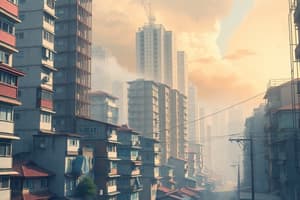Podcast
Questions and Answers
Air pollution only affects developed countries.
Air pollution only affects developed countries.
False (B)
The main pollutants of concern in air pollution are PM, NO2, SO3, CO3, and VOCs.
The main pollutants of concern in air pollution are PM, NO2, SO3, CO3, and VOCs.
False (B)
Efforts to mitigate air pollution effects do not involve stricter emission standards.
Efforts to mitigate air pollution effects do not involve stricter emission standards.
False (B)
Individuals cannot contribute to reducing air pollution by using public transport.
Individuals cannot contribute to reducing air pollution by using public transport.
Global warming is not an environmental issue influenced by air pollution.
Global warming is not an environmental issue influenced by air pollution.
Conserving energy is a sustainable practice that can help reduce air pollution.
Conserving energy is a sustainable practice that can help reduce air pollution.
Air pollution only consists of chemical air pollutants.
Air pollution only consists of chemical air pollutants.
The Earth's atmosphere is primarily composed of nitrogen and oxygen.
The Earth's atmosphere is primarily composed of nitrogen and oxygen.
Pollutants can never have a destructive effect on the ecosystem.
Pollutants can never have a destructive effect on the ecosystem.
Particulate Matter (PM) is a type of classical air pollutant.
Particulate Matter (PM) is a type of classical air pollutant.
Air pollution has no impact on human health.
Air pollution has no impact on human health.
Argon is considered a trace gas in the Earth's atmosphere.
Argon is considered a trace gas in the Earth's atmosphere.
Urban air pollution is only caused by industrial activities.
Urban air pollution is only caused by industrial activities.
Air pollution in Southwestern Asia does not exceed ambient air quality standards recommended by the WHO.
Air pollution in Southwestern Asia does not exceed ambient air quality standards recommended by the WHO.
Natural elements like sea salt and dust storms are considered non-anthropogenic sources of pollutants.
Natural elements like sea salt and dust storms are considered non-anthropogenic sources of pollutants.
Particulate matter consists only of solid particles in the air.
Particulate matter consists only of solid particles in the air.
Particulate matter is not a prevalent pollutant in urban areas.
Particulate matter is not a prevalent pollutant in urban areas.
Urban air pollution has no impact on health.
Urban air pollution has no impact on health.
Particulate Matter (PM) consists of solid particles only.
Particulate Matter (PM) consists of solid particles only.
Carbon Monoxide (CO) is a harmless gas.
Carbon Monoxide (CO) is a harmless gas.
Sulfur Oxides (SOx) are not harmful to the environment or human health.
Sulfur Oxides (SOx) are not harmful to the environment or human health.
Nitrogen Oxides (NOx) are not a major component of air pollution.
Nitrogen Oxides (NOx) are not a major component of air pollution.
Ozone (O3) is not a major component of smog.
Ozone (O3) is not a major component of smog.
Promoting the use of clean and renewable energy sources can help reduce reliance on fossil fuels.
Promoting the use of clean and renewable energy sources can help reduce reliance on fossil fuels.
Sulphate-based aerosols are a primary product of volcanic emissions.
Sulphate-based aerosols are a primary product of volcanic emissions.
Active volcanoes do not emit gases that can cause environmental and health issues.
Active volcanoes do not emit gases that can cause environmental and health issues.
High concentrations of sulfur dioxide from volcanic eruptions are not associated with any respiratory issues.
High concentrations of sulfur dioxide from volcanic eruptions are not associated with any respiratory issues.
Algae on the surface of the oceans are a source of methane emissions.
Algae on the surface of the oceans are a source of methane emissions.
Thunderstorms do not produce NOx, a type of air pollution.
Thunderstorms do not produce NOx, a type of air pollution.
Low concentrations of O3 are not naturally present at ground level.
Low concentrations of O3 are not naturally present at ground level.
Flashcards are hidden until you start studying



